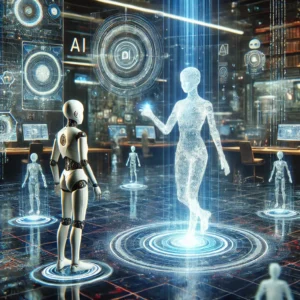What is AI?
Artificial Intelligence (AI) refers to the simulation of human intelligence in machines that are programmed to think, learn, and adapt. AI can perform tasks that typically require human intelligence, such as visual perception, speech recognition, decision-making, and language translation.

The development of AI has revolutionized various industries, from healthcare to entertainment, enabling machines to perform complex tasks efficiently.
Understanding Character AI
Character AI is a specialized subset of artificial intelligence that focuses on creating digital entities or characters with the ability to interact, communicate, and behave like real humans. These characters are designed to understand human emotions, language, and context, making them more relatable and effective in various applications.
Character AI is commonly used in video games, virtual assistants, customer service bots, and even in animated films. The characters can engage in conversations, provide information, and even exhibit emotions, making them more lifelike and engaging for users.
How Character AI Works
Character AI combines several AI technologies, including natural language processing (NLP), machine learning, and deep learning. Here’s how it typically works:
1. Natural Language Processing (NLP): Character AI uses NLP to understand and interpret human language. This allows the character to comprehend text or speech inputs and respond appropriately.
2. Machine Learning: Through machine learning algorithms, Character AI can learn from interactions and improve its responses over time. The more data it processes, the better it becomes at understanding and predicting human behavior.
3. Behavioral Modeling: Character AI can be programmed to mimic specific behaviors, such as empathy, humor, or professionalism. This is achieved through the use of complex algorithms that model human emotions and responses.
4. Real-Time Interaction: Character AI operates in real-time, allowing for seamless and dynamic interactions with users. This real-time capability is crucial for applications like virtual assistants and customer service bots.
Applications of Character AI
Character AI has a wide range of applications across different industries:
1. Gaming: In video games, Character AI creates non-player characters (NPCs) that interact with players, enhancing the gaming experience. These characters can adapt to player behavior, making the game more challenging and immersive.
2. Customer Service: Many companies use Character AI to create chatbots that assist customers with inquiries, complaints, and support. These AI-driven characters can handle multiple interactions simultaneously, improving efficiency and customer satisfaction.
3. Virtual Assistants: Character AI powers virtual assistants like Siri, Alexa, and Google Assistant, enabling them to perform tasks, answer questions, and manage schedules.
4. Entertainment: In animated movies and shows, Character AI brings digital characters to life, allowing them to display realistic emotions and interactions.
AI Image Generator and Character AI
An AI image generator is a tool that uses AI to create images based on specific inputs. These generators can create realistic images of people, objects, and scenes, often from text descriptions. When combined with Character AI, AI image generators can be used to create lifelike characters with unique appearances.
For example, an AI image generator can produce an image of a character based on a description provided by a user. This image can then be integrated with Character AI to create a fully interactive digital entity. The combination of AI image generation and Character AI is opening new possibilities in gaming, animation, and virtual reality.
Future of Character AI
The future of Character AI is promising, with advancements in AI technology continuing to push the boundaries of what’s possible. Some potential developments include:
1. Hyper-Realistic Characters: As AI technology improves, we can expect to see characters that are almost indistinguishable from real humans. These characters will be able to exhibit complex emotions, understand nuanced language, and engage in deep conversations.
2. Increased Personalization: Future Character AI systems will be able to tailor interactions based on individual user preferences, creating more personalized and engaging experiences.
3. Integration with Virtual and Augmented Reality: Character AI will play a crucial role in the development of immersive virtual and augmented reality environments, where users can interact with AI-driven characters in real-time.
Conclusion
Character AI is transforming the way we interact with digital entities, bringing a new level of realism and engagement to various applications. From gaming to customer service, the integration of AI technologies like natural language processing, machine learning, and AI image generation is creating characters that are more lifelike and capable than ever before. As the technology continues to evolve, we can expect Character AI to become an integral part of our digital lives, offering new opportunities and experiences in the virtual world.


